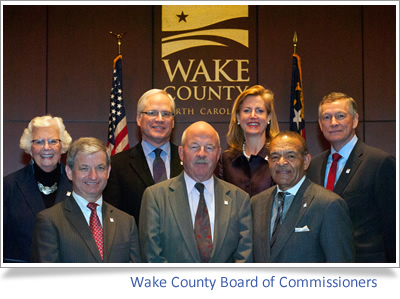All three Republicans on the Wake County Board of Commissioners are up for election, but only one seat will be on the ballot during the May 6 primary.
Incumbent Joe Bryan will be facing Fred Puryear for his seat in District 1, which covers the eastern part of Wake County. The winner of the primary race will run against Democratic challenger and Raleigh resident Sig Hutchinson in November.
Bryan, the former mayor of Knightdale, was first elected to the Board in 2002. Puryear, a relative newcomer to politics, works as a firefighter in Wilson, but has lived most of his life in Knightdale.
For the primary, Bryan is seen as the Republican favorite after garnering 86 percent of the vote in a straw poll held by the Western Wake Republican Club during the Wake GOP’s March convention.
Looking to November
With November still more than six months away, the campaign trail has been fairly quiet and there is plenty of time for candidates to take stances on known and unknown issues that crop up along the way.
Commissioners are elected for four-year terms, with a portion of the districts staggered so that there is an election every two years. Commissioners must live in the district that they represent, but are elected by residents of the entire county.

Wake Commissioners, with the exception of Tony Gurley, front left, who recently resigned.
Along with the winner of Bryan’s chair, two Republicans have Democratic challengers vying for their seat.
Incumbents Phil Matthews, District 2, and Paul Coble, District 7, are facing off against challengers Matt Calabria and John Burns, respectively.
The fourth seat up for election was previously held by Commissioner Tony Gurley.
District 3 representative Gurley resigned in February to take a job in Gov. Pat McCrory’s office. Prior to his resignation, Gurley had said that he wasn’t running for re-election because his district had been redrawn and no longer lived in the district he previously represented.
Newcomer Rich Gianni will be running in his place against Democrat Jessica Holmes in November. In the meantime, Gianni has been appointed to the Wake Commission to sit for the rest of Gurley’s term.
With a four-three split among Republicans and Democrats, one lost seat in November could mean a complete shift in power.
“I’m certainly hopeful that all four of us will be elected or re-elected,” said Bryan, adding that he and his counterparts on the board are part of the reason the area continues to receive national accolades.
“I think the community needs balance,” he said.
Bryan noted that the Wake County School Board and Raleigh’s City Council are dominated by Democrats, even though both bodies are technically nonpartisan. Wake County’s Board, he said, offers balance and perspective and “ensure that we’re hearing every voice.”
Puryear said while his views are conservative, he feels Commissioners should make decisions based on what is best for county residents.
“I think no matter who’s elected,” he said “they should be for the greater benefit of the citizens of Wake County. It shouldn’t be about any party or agenda, but what is right and best for the community.”
District 4 Commissioner Caroline Sullivan said it’s still too early to make any predictions. Sullivan, who was elected two years ago, is one of three Democrats on the Board along with longtime Commissioner Betty Lou Ward and former Raleigh City Council member James West.
“We’ve got some very good, strong candidates that I think are going to run campaigns with compelling messages,” Sullivan said.
Transit Will Likely Dominate
While it’s still too early to tell what issues will become front and center leading up to November, transit continues to dominate the county-level conversations.
Republicans have taken a lot of heat the past two years from transit supporters, who say they are stalling attempts to move forward with a regional transit plan. While Durham and Orange counties have both voted on, approved and implemented a half-cent sales tax increase that will fund improved transit, Republican Commissioners in Wake have delayed a similar vote, citing the need for more research.
Commissioners hosted a panel discussion last November after Coble called for independent experts to review the plan and provide feedback. The panelists agreed that the area could benefit from expanded bus service, but lacked the ridership numbers to make rail viable.
At their February retreat, Commissioners announced they will hold a public work session in the spring and the transit plan, which was created, in part, by former Wake County Manager David Cooke, is undergoing revisions.
“We need more transportation options in Wake County,” said Hutchinson, a former member of the Triangle Transit board who spearheaded transportation bonds for the City of Raleigh.
He said the plan needs to be refreshed and partners need to be on the same page, but if Democrats take control of the board, “as soon as reasonably possible, we would be moving forward to provide people with an opportunity to have a voice on transit.”
Bryan doesn’t support the current plan, but said discussions need to continue and the county should focus on its core services such as emergency medical services and education.
Puryear also doesn’t support the current transit plan and believes that transportation is a state and city issue.
“I don’t see how transit is going to benefit eastern Wake County that much,” he said.
Eastern Wake County is slated for expanded bus service under the plan, but rail would be primarily located in the western part of the county.
